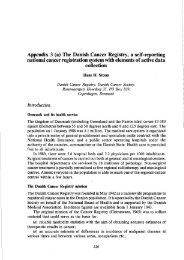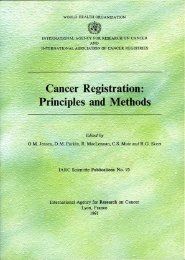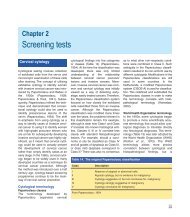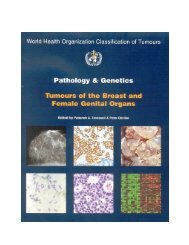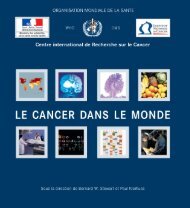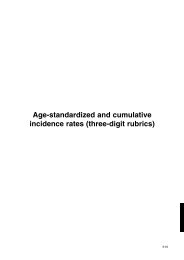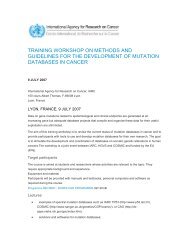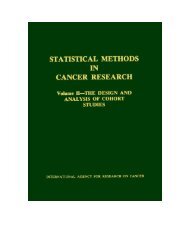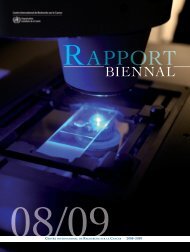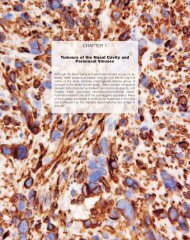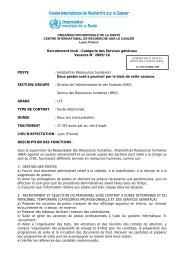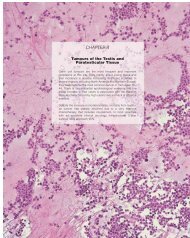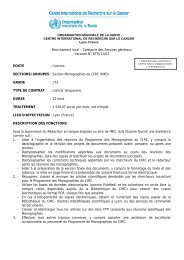world cancer report - iarc
world cancer report - iarc
world cancer report - iarc
Create successful ePaper yourself
Turn your PDF publications into a flip-book with our unique Google optimized e-Paper software.
prolonged use. Similar drugs, that is other<br />
non-steroidal anti-inflammatory drugs,<br />
appear to have this effect, and <strong>cancer</strong>s at<br />
sites apart from the bowel may be susceptible.<br />
In respect of these and similar<br />
agents, the IARC began a series of<br />
Handbooks of Cancer Prevention in 1997<br />
by considering the <strong>cancer</strong>-preventive activity<br />
of non-steroidal anti-inflammatory<br />
drugs [1]. Subsequent volumes have been<br />
published on carotenoids [2], vitamin A [3],<br />
retinoids [4] and use of sunscreens [5], the<br />
latter being substances that reduce exposure<br />
to a carcinogenic agent (in this case,<br />
sunlight).<br />
Relevant mechanisms<br />
The appropriate use of a chemopreventive<br />
agent may depend on an understanding of<br />
the mechanism of action at all levels, in<br />
animals and humans. Without this knowledge,<br />
selection of preventive agents is<br />
intuitive or the product of chance. The<br />
trend in the field of chemoprevention has<br />
therefore been to develop new agents<br />
based on known mechanisms of action.<br />
COX-2 inhibition<br />
One aspect of tumour development is the<br />
release of arachidonic acid and its metabolism<br />
to eicosanoids, including prostaglandins.<br />
Down-regulation of the cyclooxygenases<br />
(COX-1 and COX-2) by pharmacological<br />
means may result in reduced incidence<br />
of <strong>cancer</strong>, because cyclooxygenases<br />
catalyse the formation of prostaglandins,<br />
which have multiple effects that<br />
favour carcinogenesis [7] (Fig. 4.26). A<br />
number of prostaglandin synthesis<br />
inhibitors are effective in counteracting<br />
tumorigenesis. Compounds such as antiinflammatory<br />
steroids (i.e. glucocorticoids)<br />
are potent inhibitors of experimental<br />
skin carcinogenesis [8]. These compounds<br />
are effective inhibitors of phospholipase<br />
A 2, which may explain their abil-<br />
Agent Humans Animals<br />
Non-steroidal anti-inflammatory drugs<br />
Aspirin Limited Sufficient<br />
Sulindac Limited Sufficient<br />
Piroxicam Inadequate Sufficient<br />
Indomethacin Inadequate Sufficient<br />
Carotenoids<br />
β-Carotene (high dose supplements) Lack of activity Sufficient<br />
β-Carotene (usual dietary levels) Inadequate Sufficient<br />
Canthaxanthin Inadequate Sufficient<br />
α-Carotene Inadequate Limited<br />
Lycopene Inadequate Limited<br />
Lutein Inadequate Limited<br />
Fucoxanthin Inadequate Limited<br />
Table 4.12 Evidence of <strong>cancer</strong> preventive activity: evaluations from the IARC Handbooks of Cancer Prevention series.<br />
152 Prevention and screening<br />
ity to decrease the amount of arachidonic<br />
acid available for metabolism to proinflammatory<br />
prostaglandins.<br />
Aspirin and aspirin-like drugs can inhibit<br />
colorectal tumorigenesis and are among<br />
the few agents <strong>report</strong>ed to be useful for<br />
chemoprevention of neoplasia [1]. The<br />
cyclooxygenase pathway is a major target<br />
for prevention by non-steroidal antiinflammatory<br />
drugs, primarily because<br />
COX-2 plays a role in inflammation as well<br />
as in apoptosis and angiogenesis. From<br />
the perspective of chemoprevention, the<br />
recent finding that overexpression of the<br />
gene for COX-2, a key enzyme for the formation<br />
of prostaglandins from arachidonic<br />
acid, is an early and central event in<br />
colon carcinogenesis provides an important<br />
target for the development of chemopreventive<br />
agents [9]. Overexpression of<br />
COX-2 in epithelial cells inhibits apoptosis<br />
and increases the invasiveness of tumour<br />
cells [10]. Treatment of colon tumour cells<br />
Retinoids<br />
all-trans-Retinoic acid Inadequate Inadequate<br />
13-cis-Retinoic acid Limited Limited<br />
9-cis-Retinoic acid Inadequate Limited<br />
Fenretinide (4-HPR) Inadequate Sufficient<br />
Etretinate Inadequate Limited<br />
Acitretin Inadequate Inadequate<br />
N-Ethylretinamide Inadequate Lack of activity<br />
Targretin Inadequate Inadequate<br />
LGD 1550 Inadequate Inadequate<br />
Preformed vitamin A Lack of activity Limited<br />
Sunscreens Limited (squamous cell carcinoma) Sufficient<br />
Inadequate (basal cell carcinoma) -<br />
Inadequate (malignant melanoma) -



